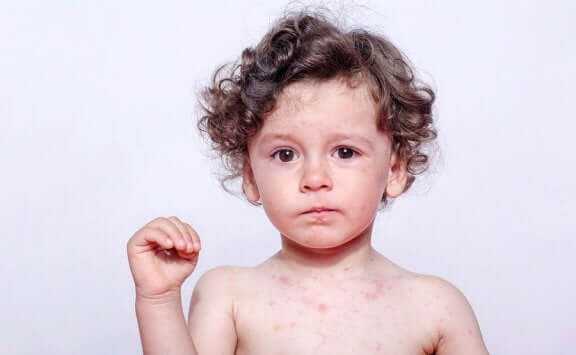My Child Has an Egg Allergy: What Should I Do?
Eggs are a typical ingredient in familiar everyday dishes and are also an essential source of proteins and vitamins in any child's diet. In spite of this, eggs are a common cause of allergic reactions during children's first years of life.

Surely you know people who are allergic to specific foods, such as nuts. Similarly, some babies show allergic reactions to eggs. Therefore, it’s normal for you to ask yourself: how can I know if my child has an egg allergy?
Eggs are a healthy ingredient because they’re rich in vitamin B. Unfortunately, some children can’t tolerate them and can experience different allergic reactions.
The good news is that in most cases, children overcome their allergies soon after they turn five. From then on, the youngsters can usually eat eggs without any inconvenience.
What does it imply to have an egg allergy?
Basically, a person’s immune system overreacts to egg proteins, as if they were a dangerous substance. Therefore, each time children consume them, their body makes specific antibodies to fight against them. Moreover, the immune system releases chemicals to protect the body, such as histamine.
This usually happens in children under five, because their immune system hasn’t quite matured completely. Because of that, children can’t digest the proteins that make up the eggs, and their bodies will treat egg proteins as a harmful invader.
How can I recognize if my child has an egg allergy?
The allergic reaction will appear within a few minutes, or even a few hours after ingesting the egg. These allergic reactions usually present themselves with the following symptoms:
- Skin reactions: a rash, redness, eczema, and even inflammation.
- Gastrointestinal reactions: abdominal pain, diarrhea, vomiting or nausea, swelling, or itching around the mouth.
- Respiratory reactions: itchy eyes, sneezing, a runny nose, wheezing, difficulty breathing, watery eyes.
- Cardiovascular reactions: accelerated heart rate, sudden decrease in blood pressure, and other problems associated with the heart.

In very few cases, those affected will manifest a severe allergic reaction called anaphylaxis.
This deserves urgent medical attention because it can cause serious problems when breathing. This type of response is commonly accompanied by oral inflammation and a sudden drop in blood pressure.
Visit the pediatrician for a safe diagnosis
You should be able to detect an egg allergy as soon as the baby consumes it. Usually, the mother will notice a rash on the baby. If that happens, you should visit the pediatrician and tell them about the reactions that your child has had after eating eggs.
If the pediatrician considers that the infant may be allergic to eggs, they’ll probably refer you to an allergist. This specialist will administer different tests; among them, a skin prick test.
In the meantime, don’t feed the baby eggs; in fact, you must avoid anything made with eggs altogether and its derivatives until the baby’s immune system matures. The child can start eating eggs again once the doctor considers that it’s safe to.
“Each time children consume them, their body makes specific antibodies to fight against them. Moreover, the immune system releases chemicals to protect the body, such as histamine.”
Beware of vaccines
Children with egg allergies should consult their doctor before applying vaccines. This is because some vaccines are incubated in chicken embryo tissues, and it’s very possible that they contain a small amount of egg protein. Therefore, you should talk to the doctor to find out if there is any danger to your child if he or she is allergic to eggs.
The vaccines with which you must have particular precaution, due to the fact that they may contain eggs, are the influenza vaccines, such as the mumps, measles, rubella (MMR) vaccine and the yellow fever vaccine.
Preventative measures
Parents must take extra precautions if their child has an egg allergy. Eggs are present in all types of food products; however, sometimes it can be challenging to determine if something contains eggs or not.
Here are some suggestions you can follow to avoid complications:
- Consult a nutritionist to help you create a personalized diet plan: children’s diets should provide them with all the nutrients necessary while excluding foods prepared with eggs or any of its derivatives.
- Find out what ingredients are used when you eat out.

- Print a list of the egg derivatives that may be present in typical everyday food and carry it with you for if you’re ever in doubt.
- Make sure your child always carries an antihistamine.
- In case they suffer a severe allergy outside the house, it’s advisable to carry an adrenaline injection with you. So, if your child accidentally ingested something made with eggs or any of its derivatives and suffers an anaphylactic attack, you can apply the injection instantly.
In summary, it’s not that difficult to lead a normal life even if you’re allergic to eggs. You just have to raise awareness and pay attention to what and where you eat. Not eating eggs is in no way an impediment for your child to enjoy delicious food!
